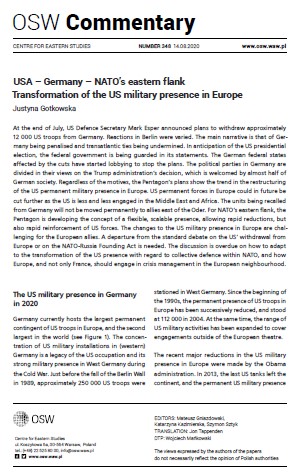USA – Germany – NATO’s eastern flank. Transformation of the US military presence in Europe
USA – Germany – NATO’s eastern flank. Transformation of the US military presence in Europe
Author(s): Justyna Gotkowska
Subject(s): Government/Political systems, International relations/trade, Security and defense, Military policy, Peace and Conflict Studies
Published by: OSW Ośrodek Studiów Wschodnich im. Marka Karpia
Keywords: USA; Germany; NATO’s eastern flank; US military presence in Germany;
Summary/Abstract: At the end of July, US Defence Secretary Mark Esper announced plans to withdraw approximately 12 000 US troops from Germany. Reactions in Berlin were varied. The main narrative is that of Germany being penalised and transatlantic ties being undermined. In anticipation of the US presidential election, the federal government is being guarded in its statements. The German federal states affected by the cuts have started lobbying to stop the plans. The political parties in Germany are divided in their views on the Trump administration’s decision, which is welcomed by almost half of German society. Regardless of the motives, the Pentagon’s plans show the trend in the restructuring of the US permanent military presence in Europe. US permanent forces in Europe could in future be cut further as the US is less and less engaged in the Middle East and Africa. The units being recalled from Germany will not be moved permanently to allies east of the Oder. For NATO’s eastern flank, the Pentagon is developing the concept of a flexible, scalable presence, allowing rapid reductions, but also rapid reinforcement of US forces. The changes to the US military presence in Europe are challenging for the European allies. A departure from the standard debate on the US’ withdrawal from Europe or on the NATO-Russia Founding Act is needed. The discussion is overdue on how to adapt to the transformation of the US presence with regard to collective defence within NATO, and how Europe, and not only France, should engage in crisis management in the European neighborhood.
Series: OSW Commentary
- Page Count: 8
- Publication Year: 2020
- Language: English
- Content File-PDF

